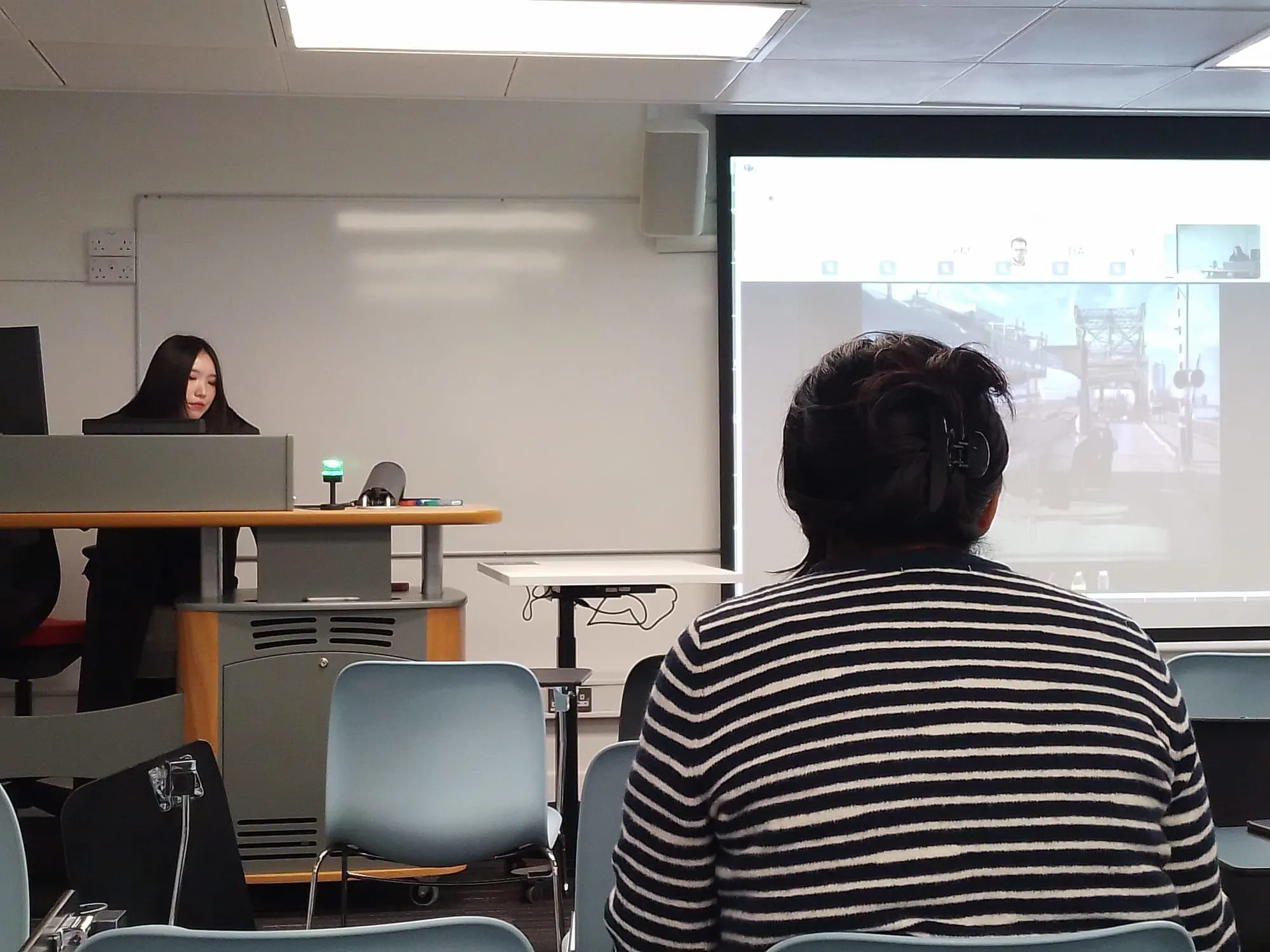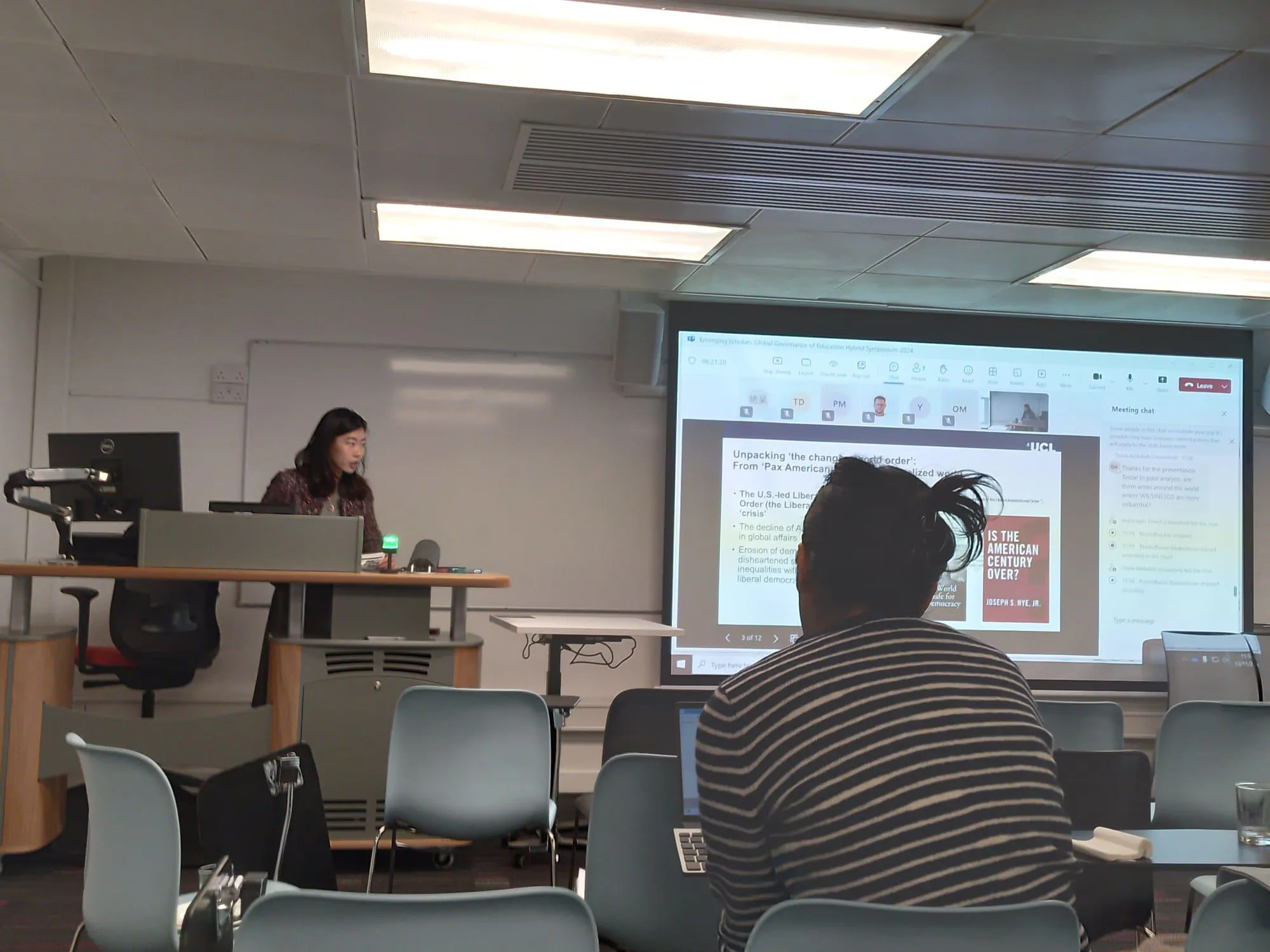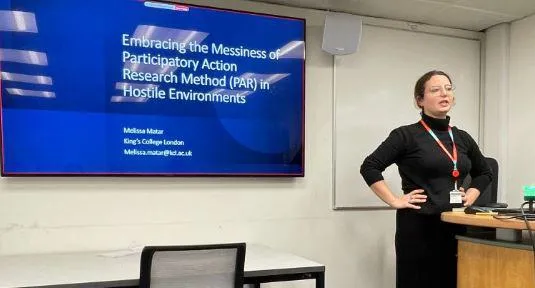Please note: this event has passed
On November 13th, the King’s International Education Research Network (KIERN) hosted the inaugural Emerging Scholars Global Governance of Education Hybrid Symposium 2024.
Funded by the Faculty of Social Science and Public Policy at King’s College London, the symposium ran from 10:00 AM to 4:30 PM in Room 1.71 of the Franklin-Wilkins Building (FWB). The event featured four individual presentations—three delivered online and one on-site—alongside a dynamic panel of doctoral students. The online symposium booklet outlines all of the sessions that were held on the day.
This symposium represents a significant initiative by KIERN to foster cutting-edge research in the global governance of education.
The event was coordinated by Pravin Balakrishnan, a doctoral student, under the guidance of Dr Maren Elfert, Senior Lecturer in International Education, both from the School of Education, Communication, and Society (ECS) at King’s College London.
Schedule of events
Session 1
10:30 – 11:30 Íris Santos - Externalisation to international elements in educational policymaking
Iris Santos presented an insightful analysis of the role of "epistemic work" in Portuguese education debates between 2001 and 2018. Drawing on theories from Alasuutari and Qadir, she explored how international references are employed as "epistemic capital" to lend authority and legitimacy to arguments in parliamentary debates and media discussions. Santos highlighted how these references help depoliticise complex topics, appealing to the audience logic and emotions. This process, she argued, facilitates social and policy change by managing the inherent uncertainty and complexity of policy-making.
Session 2
11:30 – 12:30 Ren-Hao Xu (Re)assembling future education policy mobilities within and between Taiwanese, Australian and global networks
Ren Hao Xu's presentation provided a detailed examination of the New Pedagogies for Deep Learning (NPDL) initiative as a case of emerging global education governance. Focusing on Taiwan, Xu analyzes how NPDL is adapted and reassembled in local contexts while also exploring its transnational dimensions, particularly the exchanges between Taiwan and Australia. The research highlights two significant movements: the internal evolution of education policy within Taiwan and the external mobilities of Taiwanese policymakers who engaged with NPDL practices in Australian schools. This dual perspective reveals the dynamic, multi-directional flows of ideas and practices within the global education network.
12:30 – 13:30 Light lunch
Session 3
13:30 – 14:30 Evelyn Kim Min Ji - Scripting solutions for the future: the OECD’s advocacy of happiness and well-being
Dr. Kim’s talk examines how the OECD has positioned itself as a key player in addressing future crises through its "Future of Education" initiatives. Against a backdrop of rising global challenges like geopolitical tensions, cybersecurity threats, pandemics, and climate change, Dr. Kim explores how the OECD uses "techno-scientific fictive scripts" to advocate for student happiness and well-being as central to resilience and crisis mitigation. By presenting both utopian and dystopian futures, the OECD underscores its authority in navigating uncertainty, employing systems-thinking and future studies methodologies to frame itself as both a guide and solution provider in the evolving landscape of global education policy.
Session 4
14:30 – 15:30 Tessa DeLaquil - Economic-developmental value capture of the university in World Bank & UNESCO higher education policy
Tessa’s study critically examines the role of the World Bank and UNESCO as influential international organisations in the global governance of higher education. By analysing 25 years of policy documents, she explores how these organisations wield power by framing the purpose and function of universities. Her argument highlights a predominant focus on economic development, revealing how these institutions align their visions of higher education with evolving organisational priorities, often narrowing the potential roles of universities in these contexts.
Session 5: Doctoral Students
15:30 – 16:30 Heewon Seo - Against algorithms, the aesthetics of wanderingness: Paradoxes of perfectionism
Heewon Seo's paper offers a profound critique of perfectionism within the context of a neoliberal digital dystopia, as exemplified by the Black Mirror episode "Arkangel." Seo’s work challenges the dominant algorithmic logic and calls for a renewed focus on individual exploration and embracing imperfection as essential to maturity and true learning. Seo’s presentation was deeply intellectual and thought-provoking, effectively weaving together philosophical insights, contemporary critiques, and cultural references to make a compelling argument about the limitations of algorithmic thinking and the transformative potential of moral perfectionism.

Charlene Song - Area Studies in Universities: Historical and Comparative Perspectives
Charlene’s presentation tackles the evolving role of Area Studies in the context of an increasingly globalised yet fragmented world. She explores how geopolitical tensions, international conflicts, and global challenges—alongside the growth of international institutions—shape the academic study of countries and regions within universities. By adopting a comparative perspective, Charlene aims to shed light on how Area Studies is portrayed and practiced in response to these dynamics in the current world order. By addressing the dual pressures of division and interconnectedness, Charlene’s work offered valuable insights into how universities adapt to the complexities of global governance and regional studies.

Melissa Matar - Rethinking Higher Education in Emergency under the Sustainable Development Goal 4: what can we learn from the Syrian refugee crisis in Lebanon?
Melissa Matar’s presentation explores the intersection of education and humanitarian response in Lebanon, a country facing compounded crises, including hosting the world’s highest per capita population of Syrian refugees. While international efforts in the education sector have largely focused on basic schooling, her analysis highlights the significant gap in higher education access for refugees, with only 7% enrolment compared to 47% for non-refugee youth. She situates this within the context of the 15by30 target set by UNHCR and its partners, which aims to increase refugee enrolment in higher education to 15% by 2030 under Sustainable Development Goal 4. Her presentation offered a nuanced look at the feasibility of these aspirations, the role of international and local actors, and the voices of refugee youth seeking educational advancement.

Conclusion
We would like to thank all presenters and participants for joining us throughout the conference. We are extremely grateful to the Faculty of Social Science and Public Policy (SSPP) for funding this event.
Event details
1.71Franklin-Wilkins Building
150 Stamford Street London, SE1 9NH
